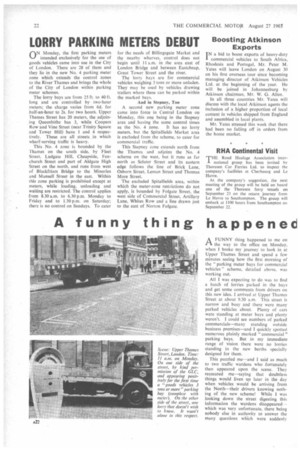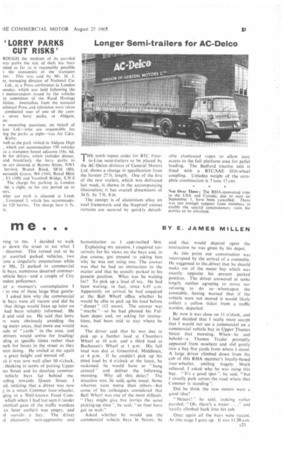A funny thing happened m e .
Page 24

Page 25

If you've noticed an error in this article please click here to report it so we can fix it.
BY E. JAMES MILLEN ikFUNNY thing happened to me on the way to the office on Monday. when I broke my journey to look in at Upper Thames Street and spend a few minutes seeing how the first morning of the " parking meter bays for commercial vehicles" scheme, detailed above, was working out.
All I was expecting to do was to find a batch of lorries parked in the bays and get some comments from drivers on this new idea. I arrived at Upper Thames Street at about 9.30 a.m. This street is narrow and busy and there were many parked vehicles about. Plenty of cars were standing at meter bays and plenty weren't. I could see numbers of parked commercials—many standing outside business premises—and I quickly spotted numerous plainly marked " commercial " parking bays. But in my immediate range of vision there were no lorries standing in the new berths specially designed for them.
This puzzled me—and I said as much to two traffic wardens who fortunately then appeared upon the scene. They reassured me—saying that doubtless things would liven up later in the day when vehicles would be arriving from the North—their drivers knowing nothing of the new scheme! While I was looking down the street digesting this information the wardens disappeared— which was very unfortunate, there being nobody else in authority to answer the many questions which were suddenly
ring to me. I decided to walk er down the street to see what ! discover. This turned out to be er assorted parked vehicles, two one a singularly ostentatious white kr Mk. 2) parked in commercial le bays, numerous deserted commertehicle bays—and a couple of City mdon policemen.
:er a moment's contemplation I to one of these large blue gentle I asked him why the commercial le bays were all vacant and did he that things would liven up later on had been reliably informed. He U and said no. He said that lorry rs were obviously avoiding the ng meter areas, that more use would lade of yards in the area, and drivers would arrive for loading/ ding at specific times rather than 'ark for hours in the street as they )een doing. He smiled at me again a great height and moved off.
ce it was now well after 10 o'clock, . thinking in terms of putting Upper les Street and its desolate commer vehicle bays far behind me. ;eding towards Queen Street, I ed. noticing that a driver was now ; in a smart Commer four-wheeler. [ging to a Well-known Food Corn
which when I had last seen it (under luizzical gaze of the traffic wardens an hour earlier) was empty. and
motAide a bay. The driver :d pleasantly non-aggressive and
humanitarian so I approached him.
Explaining my mission, I enquired tentatively for his views on the bays and, in due course, got around to asking him why he was not using one. The answer was that he had no instruction in the matter and that he usually parked in his present position. What was he waiting for? To pick up a load of tea. He had been waiting, in fact, since 6.45 a.m. Apparently on arrival he had enquired at the Bull Wharf office whether he would be able to pick up his load before "dinner (12 noon). The answer was " maybe "--so he had phoned his Fulham depot and, on asking for instructions, had been told to stay where he was.
The driver said that he was due to pick up a further load at Chambers Wharf at 10 a.m. and a third load at Buchanan's Wharf at 1 p.m. His full load was duc al Greenford. Middlesex. at 4 p.m. If he couldn't pick up his third load by 4 o'clock at the latest, he reckoned, he would have to hang around and deliver the following morning. Why all this delay? The situation was, he said, quite usual. Some wharves were worse than others--but some of his colleagues considered that Bull Wharf was one of the most difficult. " They might give five lorries the same picking-up time ", he said, "so four have got to wait."
Asked whether he would use the commercial vehicle bays in future, he said that would depend upon the instruction he was given by his depot.
At this point our conversation was interrupted by the arrival of a constable. He suggested to the...driver that he should make use of the meter bay which was exactly opposite his present parked position. The driver answered at some length, neither agreeing to move nor refusing to do so—whereupon the constable, having warned that if the vehicle were not moved it would likely collect a yellow ticket from a traffic warden. departed.
By now it was close on II o'clock, and I had decided that I really must accept that I would not see a commercial on a commercial vehicle bay in Upper Thames Street that morning. When—lo and behold—a Thames Trader promptly appeared from nowhere and slid gently into a bay five yards from where I stood. A large driver climbed down from the cab of this RHA member's locally-based four-wheeler, smiling hugely. Much relieved, I asked why he was using this bay, a good spot ". he said. "but I usually park across the road where that Commer is standing'.
Did he think the new meters were a good idea?
" Meters?" he said, looking rather puzzled, "Oh, there's a meter . . ." and hastily climbed back into his cab.
Once again all the bays were vacant At this stage I gave up. It was 11.20 a.m. .












































































































